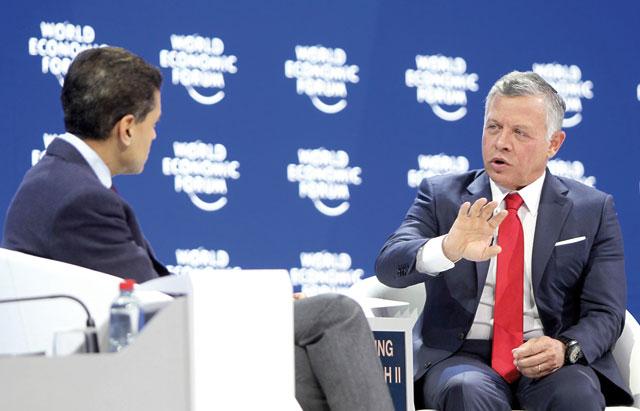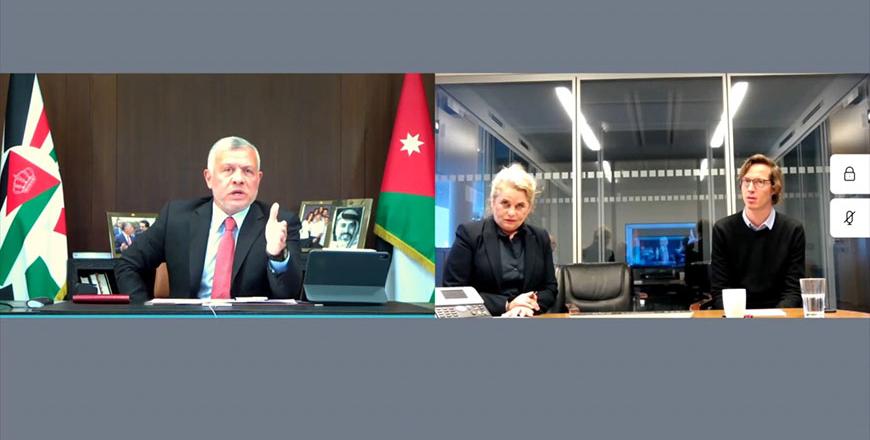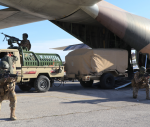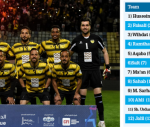You are here
Jerusalem is a city of hope that should bring us together — King
By JT - Jan 25,2018 - Last updated at Jan 25,2018

His Majesty King Abdullah talks to CNN’s Fareed Zakaria during a WEF session in Davos on Thursday (Photo courtesy of Royal Court)
AMMAN — His Majesty King Abdullah said on Thursday that it would be catastrophic for Jerusalem to become a city that divides rather than bring hope, affirming that it is “such an emotional subject for everybody” and wondering: “Is Jerusalem a city that ends up dividing us?... Or is it a city of hope that brings us together?”
The city is eternal to all monotheistic faiths, King Abdullah said, underlining that the “subject of Jerusalem has to be part of a comprehensive solution for Israelis and for Palestinians”.
Jerusalem “could be a tremendous city that brings us together, or it could create aggression and violence that we’ve never seen before”, His Majesty told CNN’s Fareed Zakaria during a session held at the World Economic Forum’s annual meeting in Davos, attended by Her Majesty Queen Rania and HRH Crown Prince Hussein (see full transcript).
Noting that everybody is waiting for a peace proposal to be provided by the United States, the King said: “The hiccup at the moment is, out of tremendous frustration; the Palestinians don’t feel the United States is an honest broker, but in the same time, they are reaching out to the Europeans, and I think, to me, that is a signal that they do want peace.”
“We cannot have a peace process… without the role of the United States,” His Majesty said at the session, which will be broadcast later by CNN on Fareed Zakaria GPS, but “none of us” knows what the US peace plan is.
Responding to a question on alternatives to a two-state solution and Israel’s stand, His Majesty said this is a question about where Israel sees its future. “If it’s a one-state solution, is it a one-state solution with equal rights?” the King asked, noting the demographic and population obstacles that would make this solution more challenging for Israel.
His Majesty stressed the need to reserve judgement on the future of the two-state solution until the United States presents its proposed peace deal.
“We have to give the Americans the benefit of the doubt, and all work together to make sure that we help the Americans, Israelis, and Palestinians come together,” the King said.
In response to a question on the Shiite Crescent, His Majesty said: “The term that I use now is Iranian Crescent, because I think the challenge that we’ve had is seeing religion used as a tool through politics”.
The King said Iranian foreign policy is affecting the region, but “we believe that dialogue is the way to solve issues, and not to exacerbate the situations that lead to armed conflict”, warning that “the drums of war” are “not going to be good for any of us.”
Commenting on the Iran nuclear deal, His Majesty said Jordan has always supported a nuclear-free zone for the Middle East, and for everybody, voicing hope that the United States and the Europeans can come to a common understanding on the agreement with Tehran.
Turning to the Syrian crisis, the King said: “I don’t think anybody wins in Syria.”
His Majesty cited the Jordanian-American-Russian success in establishing de-escalation zones in the south as “one of the good stories that we can say about Syria”.
The challenge now is to move forward in the political process through the Geneva process, the King added.
“The situation in Syria is not over by a long shot,” His Majesty said, noting the presence of several international players with their own agendas.
Responding to a question on Saudi Arabia’s current foreign policy, the King said King Salman Bin Abdulaziz is leading a proactive Saudi role that has not been seen before.
Faced with Iranian interference in Arab states, His Majesty said “the Saudi policy is to say: the red lines are here”.
Commenting on the conditions in Yemen, the King said “Yemen has historically been a challenge for any military campaigners”.
The concern is how to deal with the humanitarian crisis, His Majesty continued, stressing that “if we don’t get that right, it’s going to be something that is going to haunt us for a while”.
The King referred to the decision to provide aid through the coalition, noting that the Gulf Cooperation Council is working on a political solution in Yemen.
Discussing the West’s view of Islam, His Majesty said there is a lack of understanding of Islam; it is not a religion of hate.
Muslims believe in the Bible and the Torah, the King added.
“I’ve said it before, when we greet each other as Arabs and Muslims, we say ‘assalamu alaikum’, peace be unto you,” His Majesty said. “I think that is the basis of Islam.”
The King noted that there are challenges brought on by fringe groups that consider everyone else heretics that must be put to the sword, reaffirming that these groups threaten Muslims and followers of other faiths.
His Majesty warned that when Muslim populations in the United States, Europe and elsewhere feel victimised and isolated, that creates a breeding ground for contempt.
“For them to feel isolated that’s the danger,” the King cautioned, stressing that the global fight against terrorism is a long-term problem — a third world war by other means — that must be fought within a holistic approach, and the United States has been the most active partner.
In response to a question on developments in the region since the Arab Spring, His Majesty said that period was “a very important crossroads”.
The King said this was started by young people in the region who wanted dynamic change — “change that they deserve” — but it was hijacked, by extremist groups with their own agendas.
For Arab countries to move forward, His Majesty said they should learn from the experiences of European and African countries and the way these countries coordinate among themselves on various issues, such as trade and security.
“They’re showing us an example how to move in the right direction,” the King added, stressing the importance of Arab countries working together towards development and economic integration.
Related Articles
AMMAN — Following is the full transcript of His Majesty King Abdullah’s conversation with CNN’s Fareed Zakaria on Thursday, January 25, 2018
AMMAN — German magazine Der Spiegel published on Friday an interview with His Majesty King Abdullah that covered the latest developments in
AMMAN — Deputy Prime Minister and Foreign Minister Ayman Safadi on Friday strongly denounced the "inhumane and hateful Israeli attacks"


















